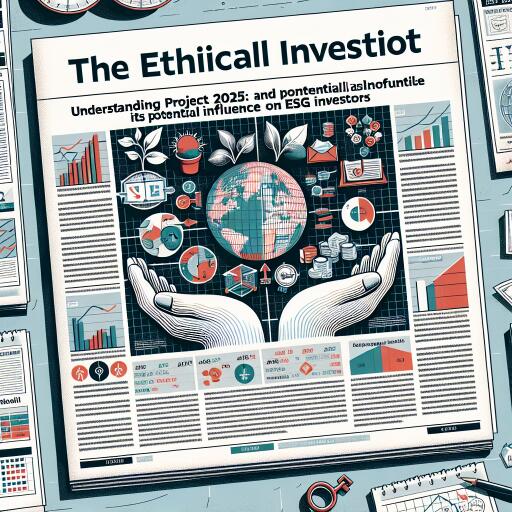
The Ethical Investor: What is Project 2025 and How Could it Impact ESG Investors?
Project 2025 has become a focal point of global discussion, opening up debates on its implications for environmental, social, and governance (ESG) investors across the globe. Launched in April 2022 by a conservative think tank, this comprehensive 922-page agenda seeks to reshape various sectors of US policy, predominantly accentuating conservative values under the reestablished leadership of Donald Trump.
The project stands out for its ambitious endeavors to reinforce conservative influence across US government entities. Its agenda encompasses controversial transformations, such as placing partisan control over the Department of Justice, the Federal Bureau of Investigation (FBI), and the Federal Communications Commission (FCC). The initiative also promotes dismantling major departments like the Department of Homeland Security and the Department of Education.
Project 2025 presents a dramatic pivot on how the United States addresses environmental and social issues. It proposes a reduction in regulations affecting fossil fuels and posits a regression on climate and environmental policies. Furthermore, it forwards a strong conservative stance on social norms, challenging issues like abortion and LGBTQ+ rights, thereby advocating for traditional Christian ethics.
A key focus of Project 2025 lies in overturning international environmental agreements. It suggests a US retreat from cooperative international climate frameworks, including potential withdrawal from the Paris Climate Agreement and the UN Framework Convention on Climate Change. Given the US’s status as a leading greenhouse gas emitter, these actions could significantly undermine global efforts to battle climate change.
From a defense policy perspective, Project 2025 largely overlooks the climate crisis, omitting its role in exacerbating global tensions and resource scarcities. The dismissal of climate change as a strategic consideration hampers comprehensive defense strategies addressing the global climate threat.
Domestically, the proposals pose a challenge to progressive climate initiatives by advocating for decreased regulation on fossil fuels. This could stall the US’s energy transition from traditional energy sources to renewable alternatives, with potential reverberations for the global movement towards sustainability.
The implications of Project 2025 could ripple across international relationships, particularly affecting partner nations like Australia. The initiative outlines a more forceful US military presence in the Asia-Pacific, aimed at curbing China’s regional influence. This could deepen military cooperation with Australia, involving enhanced joint operations or additional US military installations.
Aside from military strategies, Project 2025 also recommends a strategic decoupling of US-China economic ties. Such an economic realignment could reverberate through Australia’s economy, heavily reliant on trade with China, especially in resources like coal and iron ore. Australia might find itself in a precarious position between two major powers, balancing economic interests and geopolitical alignments.
The economic separation encouraged by Project 2025 could introduce instability in global trade, potentially impacting Australia’s exports adversely and promoting domestic fossil-fuel interests amidst lessened international expectations to lower emissions. This scenario could create dilemmas for Australia’s environmental policymaking and relationships with global allies, sustaining or escalating climate challenges.
For ethical investors in Australia, the measures proposed by Project 2025 might complicate efforts to prioritize environmental and social governance criteria. The potential shift towards an energy-intensive and isolationist economy would likely obscure investments’ environmental impacts, introducing new challenges for aligning investments with ESG principles.
In summary, Project 2025 offers a contentious vision of national policy with profound implications for environment-focused investors globally. The ambitious yet polarizing nature of these proposals could redefine international and domestic approaches to critical issues surrounding climate change, economic policy, and societal values. As the world grapples with these potential changes, the role of ethical investing becomes ever more significant in navigating the crossroads of ideological and environmental stewardship.





Leave a Reply